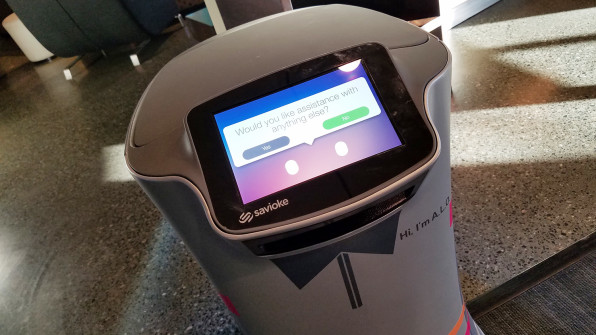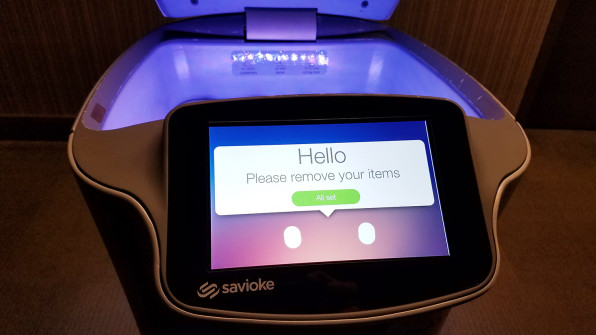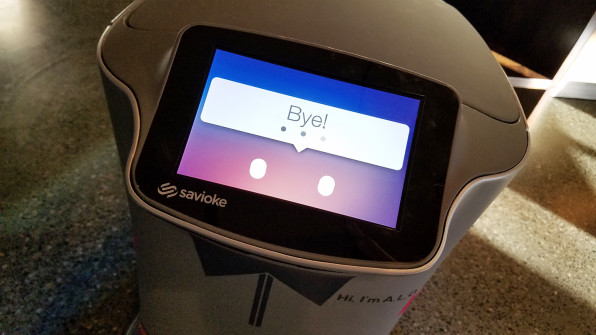It’s midnight. I’m on a business trip in Cupertino, California and after sending off a few final emails, I change into my pajamas, and then it hits me: I’ve forgotten my toothbrush.
This is not the first time I’ve done this and most of the time, when I do, I swing by the front desk and grab one. But when it’s really late and I’m in my pajamas, I’m a little less inclined to head downstairs to model my choice in sleepwear for the folks still at the hotel bar.
So I call the Aloft Hotel’s front desk for room service, and a few minutes later open my door to get my toothbrush from Botlr, the hotel’s robotic butler.
Botlr, who has been on staff since 2014 and looks a tiny bit like a rolling trash can, works 24/7 delivering everything from extra towels to snacks and drinks. When a guest calls the front desk, the attendant places the requested item inside of the head of the bellhop on wheels, programs in the room number, and off it goes.
And Botlr knows its way around. It even takes the elevator on its own. A phone call to the guest is made when Botlr arrives at your door.
A Unique Solution To a Unique Problem
There’s pretty much only one reason one might find themselves in Cupertino: Apple. The Aloft across from Apple’s campus. The tech giant has building upon building located off De Anza Boulevard in which engineers and designers are creating the next generation of iPhones, iPads, and laptops. In many ways, it makes sense that the first robotic butler works here.
Before Botlr, my toothbrush request would have required the front desk attendant to leave his post and take the elevator up to my room. That’s not a big deal on a slow night, but if another guest also needed assistance, having a robotic butler to give a helping hand can be a big help.
The First Of Its Kind
Other hotels are buying into the ongoing robot revolution in hotels. A few years back, the introduction of robotic bartenders made a huge splash. Savioke, the startup that made Botlr, has 59 different contracts for the robot butlers across the United States and one in Singapore.
But they’re not all called Botlr—Savioke calls the model a “Relay.” Aloft renamed their Relay to Botlr.
“There’s a lot of creativity in terms of naming these robots,” says Tessa Lau, CTO at Savioke. Hotels create names that they think best reflect their personality.
So how do the robots know how to navigate hotels on their own? Lau says an installation tech trains them to navigate through hallways and lounges using a PlayStation joystick.

“We drive Relay around and we show him where everything is. It’s kind of like bringing a new trainee on board and saying ‘Here’s the break room, here’s the lounge, here’s the front desk.’ After we do that, then Relay knows how to get around and it can go fully autonomous,” says Lau.
Lau says that Relay has a bunch of sensors onboard, including laser sensors, depth cameras, and sonar that help it put together a pretty good map of the hotel it’s in. The only place Savioke needs to install anything is the elevator.
“We’re actually the first robotics company to really develop a method for connecting to pretty much any elevator in existence,” says Lau. “We install a connector near the elevator system which gets wired into the elevator, then Relay can talk to our box.”

At the Aloft, that means Botlr can roll up to the elevator and call it down. Once inside, it wirelessly presses the button for the destination floor.
Botlr is a model employee but there was a bit of a learning curve in its early days. One issue: maids.
Botlr is programmed to detect objects, like, say, people, in its path and move around them. It initially had a lot of trouble with maid carts. When it came across one in the hallway it would assess the situation and get stuck, thinking there was no way to get through. After a few months of troubleshooting, the Savioke team was able to improve Botlr’s navigation.
Savioke also has a 24/7 call center that’s constantly monitoring its fleet of robots. Lau says that the call center is notified whenever a robot gets into trouble, and is usually able to correct the issue remotely before the hotel realizes there’s an issue.

Speaking of the hotel, another interesting thing to note is they don’t actually own Botlr.
“What we discovered on the business side is that they don’t want to own the robot. They don’t want to hire roboticists and maintenance people and service people to figure out what to do with it when it breaks. What they actually want is just an ongoing monthly expense,” Lau says.
For a flat monthly fee of roughly $2,000 with a 3-year contract, a hotel gets use of the robot as well as any maintenance and service it needs.
“From a hotel perspective it’s just like hiring another team member,” says Lau. A team member like no other.
Fast Company , Read Full Story
(62)